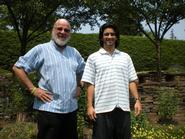
Mysticism, or the study of individuals who seek to access a higher-than-sensory reality, is a relatively abstract topic of study, but Sean Fujimori ’14 is hoping to bring the teachings and ancient traditions of the mystics into modern society. Fujimori, a philosophy and neuroscience major, is pursuing his study on mysticism with an Emerson Foundation Summer Research Grant under the guidance of John Stewart Kennedy Professor of Philosophy Richard Werner.
Fujimori’s research includes the study of various Eastern cultures and an extensive bibliography on mysticism. He will summarize his findings on the need for mysticism in modern society and methods for integrating mysticism into modern life with a concluding essay.
Fujimori is pursuing research on mysticism because he believes that “modern society has lost sight of our environment [and that] people have lost sight of each other.” He paraphrased the famed late novelist and Pomona College professor David Foster Wallace, saying that “[people] have lost a sense of connection with that which brings us contentment and satisfaction … [by] becoming caught up in materialism and narcissism.” The purpose of Fujimori’s summer research is to discover the modern day “divine spark” that leads to human fulfillment, which he believes is rooted in the teachings of mysticism.
While mysticism has roots in Eastern religions, Fujimori cautioned that religion cannot be the sole answer to the question of self-fulfillment. He commented that many people within the world of religion, be they Christian, Jewish, Hindu or Islamic, possess the “divine spark” that he is searching for, a sense of self-awareness and self- comfort. While Fujimori applauded individuals like the Dalai Lama for their guidance in helping others achieve self-fulfillment, he emphasized that many people choose to experience religion as a social construct. He sees the social constructs of religion as “[having] nothing to do with mysticism and self-fulfillment. Mysticism has more to do with awareness, the organic and ‘real’ value of religion.”
Social constructs, whether of a religious, occupational or societal nature, are often part of the problem, according to Fujimori. He reflected Foster’s belief that people are increasing caught up with the roles they play in society and losing their sense of self-connection. According to Foster and Fujimori, people cannot follow a preset path or social construct in order to find fulfillment, but instead must pursue a unique path they lay out for themselves.
Fujimori believes that he key to reclaiming the “divine spark” of self-fulfillment lies in the kinds of self reflection practiced by Eastern thinkers for hundreds of years, such as meditation and certain types of yoga. He cautions against approaching Far Eastern methods of self reflection with a constrictive Western mindset, and says that all people can benefit from meditation and the study of Eastern thought regardless of their religious beliefs. Fujimori says that with self-reflection and the realization that their lives are the product of their actions, people can once again find the “divine spark” of self fulfillment that has escaped them in the modern day.
Fujimori is a graduate of Philips Exeter Academy (N.H.)
Posted August 4, 2012
